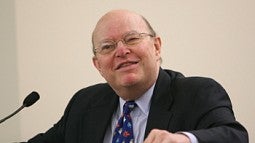
Strickland, a legal scholar of Osage and Cherokee heritage, focused on law and society, especially cultural issues. He retained an expansive view of the law and urged students to pay attention to impact of the law on real people and their cultures. His scholarship on Indian law and legal education is renowned as are his books on Indian culture.
Strickland guided the Wayne Morse Center’s 2005-07 theme of inquiry on Indigenous Peoples: National Policy and International Human Rights. Margaret Hallock, Founding Director of the Wayne Morse Center, called this two-year inquiry “one of our richest themes.” Strickland’s stature brought leaders in the Native community to Oregon and helped establish Native American Studies at the UO. During the first year of the inquiry, Wilma Mankiller, the first woman elected to serve as Principal Chief of the Cherokee Nation, was in residence at the center as Wayne Morse Chair of Law and Politics and co-taught a class with Strickland on tribal history and culture. In the second year, W. Richard West, the founding director of the Smithsonian National Museum of the American Indian, held the Wayne Morse Chair. The center held events on Native American leadership and education, women’s tribal leadership, museums and repatriation, indigenous languages and tribal leadership in environmental issues, and featured a symposium in Strickland’s honor, “From the Warrior Viewpoint: the Next Generation of Indian Law and Policy,” on April 14, 2006.
Strickland stated, “History suggests that if mankind is to survive, the next five hundred years must be rooted in the pre-Columbian ethic of the Native American. The second American quincentenary belongs to the Indian. The continuation of the past, the conqueror's exploitation of the earth, can mean only one thing. No one, Indian or nonIndian, will survive.”1
Strickland was a gentle but strong leader. He was endlessly patient and always brought out the best in people.
“We will always be in debt to Rennard Strickland for his vision and leadership. He led the Wayne Morse Center from a fledgling start-up to a vigorous center for education and discussion,” Hallock said.
1 Wayne Morse Center for Law and Politics, Indigenous Peoples Theme of Inquiry, Memorial Placard (June 2007).
